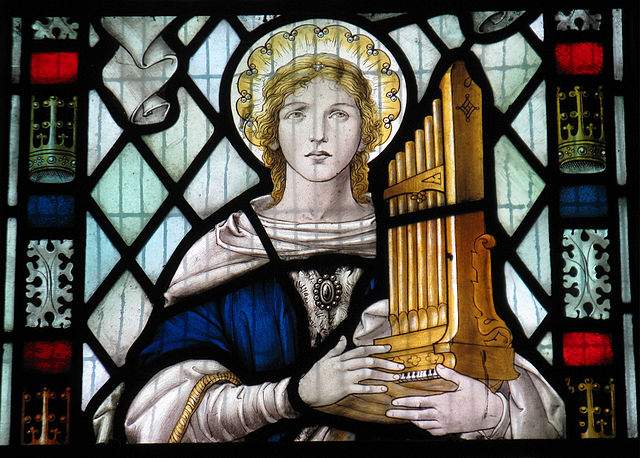
This hour on Harmonia, we're celebrating the feast day of St. Cecilia, the patron saint of – you guessed it – music. Supposedly beheaded with a sword, her feast day, observed on November 22nd, has been celebrated since around the 4th century. Our featured release is from Edward Higginbottom and the musicians of New College, Oxford.
We heard the overture to Handel's Ode for St. Cecilia's Day, performed by The English Concert, under the direction of Trevor Pinnock.
Immortal Fire
In a garden shady this holy lady
With reverent cadence and subtle psalm,
Like a black swan as death came on
Poured forth her song in perfect calm:
And by ocean's margin this innocent virgin
Constructed an organ to enlarge her prayer,
And notes tremendous from her great engine
Thundered out on the Roman air.
Blonde Aphrodite rose up excited,
Moved to delight by the melody,
White as an orchid she rode quite naked
In an oyster shell on top of the sea;
At sounds so entrancing the angels dancing
Came out of their trance into time again,
And around the wicked in Hell's abysses
The huge flame flickered and eased their pain.
Blessed Cecilia, appear in visions
To all musicians, appear and inspire:
Translated Daughter, come down and startle
Composing mortals with immortal fire.
Among composers, there is a long tradition of music written in thanks and praise of St. Cecilia, the patron saint of music. That text, by W. H. Auden, was written at the request of Benjamin Britten, but everyone from Henry Purcell to Paul Simon seems to have referenced her at least once! Her feast day is celebrated on November 22nd. Purcell wrote a number of pieces for the occasion.
We heard "Welcome to All the Pleasures," one of Purcell's odes, written for St. Cecilia's Day. It was performed by the Taverner Consort, Choir & Players, all under the direction of Andrew Parrott.
St. Cecilia's Martydom
As is the case for many saints of the church, St. Cecilia came by her sainthood in a rather gruesome fashion. According to legend, despite her vow of virginity, she was forced to marry the heathen nobleman Valerian. At her wedding, she sat apart, singing to God in her heart – and later, when it came time for the marriage to be consummated, she told Valerian that she had an angel watching over her, who would punish him if he violated her vow, but who would love him if he could respect it. When he asked to see the angel, she sent him off to be baptized, and when he returned, he had a vision of an angel, standing by her side, and crowning her with a crown of lilies and roses. Although historians no longer consider the details of Cecilia's story to have much basis in fact, her existence and martyrdom, apparently accomplished through beheading with a sword, are not disputed.
We heard the beginning of Handel's "Ode for St. Cecilia's Day," performed by The English Concert, under the direction of Trevor Pinnock.
Ode for St. Cecilia's Day
Welcome back. This hour on Harmonia, we're celebrating the feast day of St. Cecilia, the patron saint of musicians. We've been listening to Handel's "Ode for St. Cecilia's Day."
We heard music from Handel's "Ode for St. Cecilia's Day," performed by The English Concert, under the direction of Trevor Pinnock.
Exultent superi
On our featured release, we hear from Edward Higginbottom and the young musicians of New College, Oxford. The recording Exultent superi features motets of the 18th century French composer François Couperin, including the reconstructed "Resonent organa," a motet in honor of St. Cecilia, the patron saint of musicians.
We heard the motet "Resonent organa," from the 2012 recording Exultent superi, performed by Edward Higginbottom and the musicians of New College, Oxford.
Break and theme music
:30, Purcell: Odes, Taverner Consort, Choir & Players, Warner Classics 1999, D. 2, Tr. 1 Symphony
:60, Purcell: Odes, Taverner Consort, Choir & Players, Warner Classics 1999, D. 2, Tr. 1 Symphony
:30, Purcell: Odes, Taverner Consort, Choir & Players, Warner Classics 1999, D. 2, Tr. 1 SymphonyÂ
Theme:Â Danse Royale, Ensemble Alcatraz, Elektra Nonesuch 79240-2 1992 B000005J0B, Tr. 12 La Prime Estampie Royal
The writer for this edition of Harmonia was Elizabeth Clark.
Learn more about recent early music CDs on the Harmonia Early Music Podcast. You can subscribe on iTunes or at http://www.harmoniaearlymusic.org.









